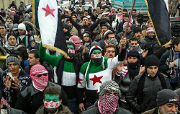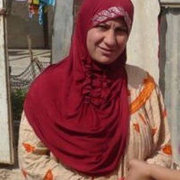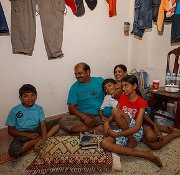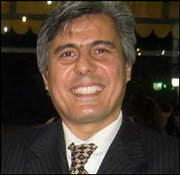Murder of Christian senator, physician leaves big plans unfinished
 |
| The Church of Christ in Nigeria, Bachit village. Dantong nearly singlehandedly funded the construction of the expanded sanctuary. (ODN photo) |
JOS, Nigeria, July 23 (Open Doors News) -- Gyang Dantong was killed while attending a funeral.
He was among a handful of elected members of Nigerian government attempting to bury the more than 100 Christians killed just the day before, when Muslim gunmen had rampaged through several villages in Nigeria’s central Plateau state.
The sheer scale of the violence July 7 convulsed a country where attacks upon Christians are commonplace. Then the attackers returned the next day, killing scores more, including Datong, 53, and another elected government official, who had gathered to bury their dead. The two days of brutality have pushed Nigeria beyond shock into a debate about whether it can even survive as a nation.
The death of Senator Gyang Dantong, a member of the National Assembly, reverberates through Nigeria’s struggle to hold itself together.
Gyang Dantong
“Senator Dantong was the bridge between religions, cultures and tribes,” said Senate Majority Leader Victor Ndoma-Egba at a July 18 valedictory session of the National Assembly. “Let his death not be in vain. Leaders of all inter-religions and cultures owe it to themselves and Senator Dantong to terminate this culture of hate and promote reconciliation and peace that Plateau was known for.”
Yet the void created by Datong’s death may be felt most directly on a more personal scale, certainly by his wife, Hanatu, and three children, but also by the surviving members of his church and hospital, both of which he helped to build. As all of Nigeria paid its respects to Dantong’s national legacy, Open Doors News sought out those closest to him to reveal his legacy to Nigeria’s suffering church.
Service to God
Gyang Dalyop Dantong was born in February 1959, in the village of Bachit, about 50 kilometers south of Jos, the capital of Plateau State, in central Nigeria. The son of a pastor, he studied medicine at the University of Jos, and at the University of Legon, in Ghana.
He worked for several years at the Vom Christian Hospital, about 30 kilometers southwest of Jos, before being elected into Nigeria’s National Assembly. He served four years in the House of Representatives, and then was elected to the Senate, where he had served for the past five years.
The church of Dantong’s youth, a Church of Christ in Nigeria congregation in Bachit, was founded in 1936, and had about 550 members at the time of the July 7 and 8 attacks, according to its pastor, Rev. Bulus Alamba Bindi.
“Bachit is a village whose population are farmers,” Bindi said. “Only a few of them are in public service and they live in townships. As for the commitment of these villagers to the Gospel I can tell you that they have embraced the faith without reservation.”
Dantong may have been among the few villagers to leave farming behind to take up a profession, but he remained a student of the faith. A physician by training, a senator by avocation, he also was pursuing a divinity degree from the Theological College of Northern Nigeria in the town of Bukuru, near Jos.
And he remained active in the church’s local affairs. He provided the funding to build a church building in the village of Gashish, about 12 kilometers south of Bachit, Bindi said. The church building, he said, later was burned by Muslim attackers.
When the Bachit church – a simple rectangular structure -- needed renovation, Dantong again offered his help, even though his regular place of worship had become the Church of Christ in the town of Vom, about 15 kilometers away.
“When he came to us with the decision to assist us build the church, we asked him to allow us to handle the work, but he said no to our request and insisted in bearing the complete cost of building the church,” Bindi said. “He said he has made up his mind to build a sanctuary for the Lord.”
Dantong provided 6 million Nigerian naira – about US $38,000 – to reconstruct the church’s sanctuary, complete with a terrazzo floor, Bindi said.
“What are left (to install) in the church now are pews,” he said. “He was preparing for the second and last phase of the construction work when he died.”
His murder, and the wider violence that forced many Christians to flee from their homes in and around Bachit, has not only left a church building unfinished. It also has cut the congregation down to 40 elderly members.
“They said they cannot run away because they do not have the strength to leave,” Bindi said. “They prefer to remain and die here.”
Service to the sick
Dantong was a fixture at Vom Christian Hospital, established by the Church of Christ in Nigeria in 1922. He worked as the hospital’s medical superintendent for about 10 years.
He was “a committed member of our church and a former church worker, medical doctor, with our hospital at Vom,” said Rev. Dachollom Datiri, Vice President of the Church of Christ in Nigeria.
Hospital staff members tell stories about how, for two years, Dantong ran the 154-bed hospital as the only physician in residence, tending to about 150 patients daily. He is also said to have carried out, in some weeks, as many as 15 surgeries.
“He was the only medical doctor we had for about two years here, and during this time, he was on call duties every single day,” said David Yakubu, a radiographer at the hospital.
“He never had time to even go back to his house to eat. Instead, his wife brought his food to him in the theater where he carried out surgeries,” said Sarah Elijah Kpadu, the hospital’s chief matron.
His election to the National Assembly took him away to the capital, Abuja, about 150 kilometers away. Even so, Kpadu said, “his love for this hospital was so great that he returned from the national assembly to assist in surgeries on a weekly basis.”
Vom Hospital’s current medical superintendent, Dr. Samuel Dido, said Dantong’s commitment to the church hospital was a personal sacrifice.
“Dantong gave his life to work in this hospital in spite of the fact that he had better opportunities to work in public hospitals or elsewhere where he could earn better salaries,” Dido said.
“He also was building a 12-room private ward, as a donation to this hospital, before he died.”
That project, as with the Bachit church and so many other bridges Gyang Dantong had begun to build, now is left to the survivors to complete.
END
**********
Copyright 2012 Open Doors News















